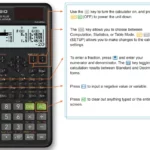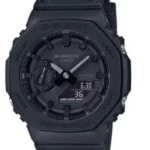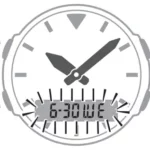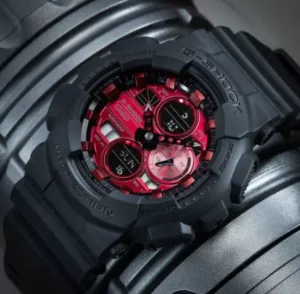
CASIO 5612 G-Shock Smart Watch

- Depending on the model of your watch, digital display text appears either as dark figures on a light background or light figures on a dark background. All sample displays in this manual are shown using dark figures on a light background.
- Button operations are indicated using the letters shown in the illustration.
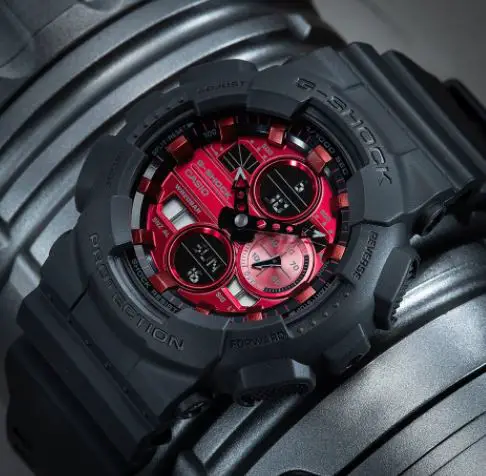
- Note that the product illustrations in this manual are intended for reference only, and so the actual product may appear somewhat different than depicted by an illustration.
- Each section of this manual provides you with the information you need to perform operations in each mode. Further details and technical information can be found in the “Reference” section.
- To ensure that this watch provides you with the years of service for which it is designed, carefully read and follow the instructions under “Operating Precautions” and “User Maintenance.”
General Guide
- Press C to change from mode to mode.
- In any mode (except a setting mode), press B to illuminate the face.
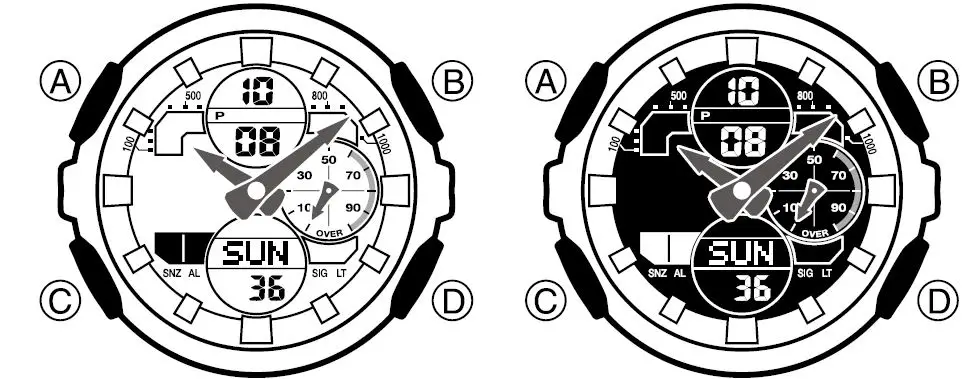
Timekeeping
You can adjust the Home Time city date and time in the Timekeeping Mode.
- The analog time of this watch is synchronized with the digital time. The analog time setting is adjusted automatically whenever you change the digital time.
- If the analog time does not match the digital time for any reason, use the procedure described under “To adjust home positions” (page E-44) to match the analog setting to the digital setting.
- Pressing D in the Timekeeping Mode toggles digital display between the Home City Date and Home City Time.

To set the digital time and date
- In the Timekeeping Mode, hold down A for at least three seconds until the currently selected city code flashes in the lower digital display. This is the setting mode.
- Use D (east) and B (west) to display the city code you want to select.
- Make sure you select your Home City code before changing any other setting.
- For full information on city codes, see the “City Code Table” at the back of this manual.
- Press C to change the flashing screen content in the sequence shown below to select the other settings.
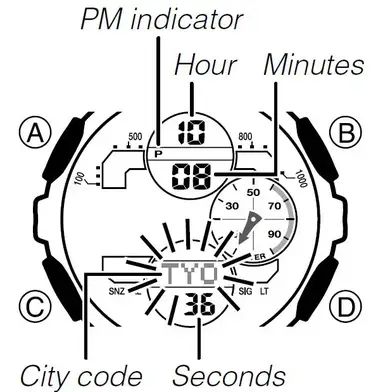
- When the setting you want to change is flashing, use D or B to change it as described below.
- Press A to exit the setting mode.
- The day of the week is displayed automatically in accordance with the date (year, month, and day) settings.
Daylight Saving Time (DST)
Daylight Saving Time (summer time) advances the time setting by one hour from Standard Time. Remember that not all countries or even local areas use Daylight Saving Time.
To change the Daylight Saving Time (summer time) setting

- In the Timekeeping Mode, hold down A for at least three seconds until the currently selected city codeflashes in the lower digital display. This is the setting mode.
- Press C. This will display the DST setting screen.
- Use D to toggle the DST setting on (on) and off (OFF).
- The default DST setting is off (OFF).
- When the setting you want is selected, press A to exit the setting mode.
- The DST indicator appears to indicate that Daylight Saving Time is turned on.
12-hour and 24-hour timekeeping.
- With the 24-hour format, times are displayed in the range of 0:00 to 23:59, without the PM indicator.
- The 12-hour/24-hour timekeeping format you select in the Timekeeping Mode is applied in all other modes.
Stopwatch
You can use the stopwatch to measure elapsed time, lap times and split times. If you specify a distance value, the stopwatch also will calculate and display speeds.
- The digital display range of the stopwatch is 99 hours, 59 minutes, 59.999 seconds. The stopwatch continues to run until you stop it. If it reaches the above limit, it will restart the time measurement from zero.
- The stopwatch operation continues even if you exit the Stopwatch Mode. If you exit the Stopwatch Mode while a stopwatch operation is in progress, the upper digital segments will appear and disappear sequentially in accordance with the passage of timekeeping seconds. This is to let you know that a stopwatch operation is in progress.
- All of the operations in this section are performed in the Stopwatch Mode, which you enter by pressing C (page E-7).
Important!
- Check to make sure that the speed hand is not moving before you perform any Stopwatch Mode button operation. Specifying a Distance Value You can use the procedure below to specify a distance value, if you want. If you specify a distance value, the watch will calculate and indicate speed for certain stopwatch operations.
- The distance value represents kilometers, miles, or any other distance unit you want. Specifying a distance value of 10.0, for example, can mean 10.0 kilometers or 10.0 miles.
- No speed calculation is performed when 0.0 is specified as the current distance value.
- For lap time readings, you can specify either the lap distance (when all the laps are the same distance) or the total race distance.
- For split time readings, you can specify the total race distance only. Though the watch will indicate a speed each time you take a split reading, they will be based on the total race distance, and so they will not indicate actual intermediate split speeds.
To specify a distance value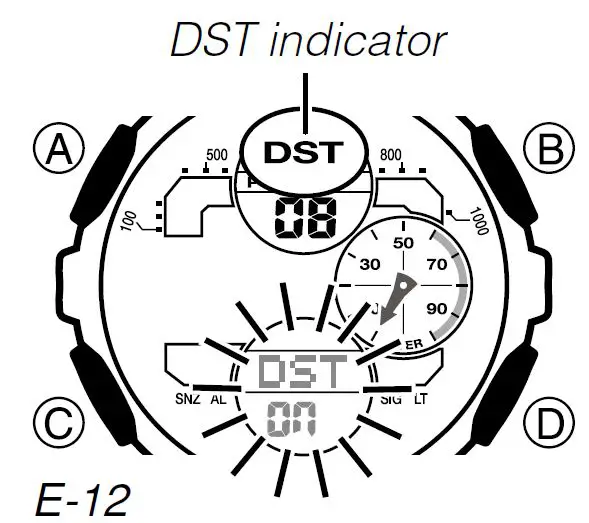
- In the Stopwatch Mode, make sure the stopwatch is stopped and reset to all zeros.
- If you need to reset the stopwatch to all zeros, press A.
- Hold down A for at least three seconds until the current distance value setting flashes in the upper digital display.
- This is the distance value setting mode.
- Press C to move the flashing between the values on the left side and right side of the distance value decimal point.
- While a distance value is flashing, use D (+) and B (–) to change it.
- You can specify a distance value in the range of 0.1 to 99.9.
- After specifying the distance value you want, press A to exit the setting mode.
How speed is indicated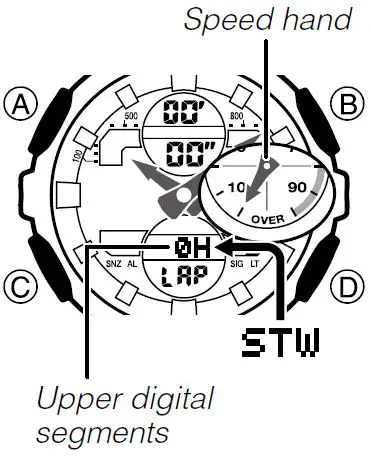
- While an elapsed time measurement operation is being performed in the Stopwatch Mode, the watch will indicate a speed value, which is calculated based on the distance you specified and the elapsed time. The speed value is indicated as described below.
- Upper digital segments: 100 unit
- 1000 appears when the speed exceeds 1,000.
- MACH appears when the speed exceeds 1,226.
- The speed hand indicates speed values less than 100. Only even-numbered values are indicated.
- Speed can be indicated from 0 to 1998. OVER is indicated by the speed hand when the speed exceeds 1998.
Example:
- When the speed value is 1,740.
- Speed hand: Indicates 40.
- Upper digital segments: Indicate 700.
- 1000 and MACH indicators: Displayed
Time Measurement
You need to specify either lap time (page E-21) or split time (page E-23) measurement before you start a stopwatch operation. If you want to measure total elapsed time, select split time measurement.
To specify lap time or split time readings
- In the Stopwatch Mode, make sure the stopwatch is stopped and reset to all zeros.
- Make sure that LAP (lap times) or SPL (split times) is shown in the lower digital display.
- If you need to reset the stopwatch to all zeros, press A.
- You can toggle between LAP (lap times) and SPL (split times) by pressing A.
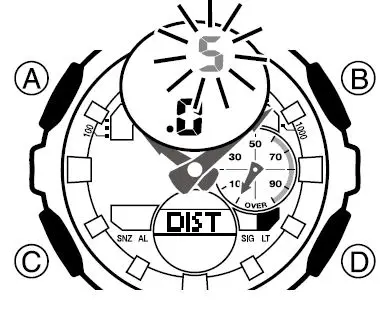
Elapsed Time Measurement
Use the following procedure to measure elapsed time, without taking lap time or split time readings. To perform elapsed time measurement
Select split time (SPL) measurement and then perform the following button operations. D Start ➝ D Stop ➝ A Reset
- If you have a distance value (page E-15) specified for the current elapsed time measurement, the upper digital segments and speed hand will indicate the speed when you press D to stop the elapsed time operation.
- After pressing D to stop an elapsed time operation, you could press D again to restart from the point where you left off.
Lap Time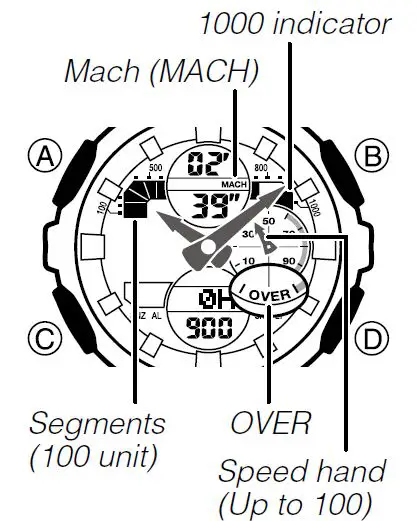
Lap time readings appear in the upper digital display. They show the time elapsed since the last lap time reading was taken.
- If you want the watch to calculate the speed of each lap (when all of the laps are the same distance), specify the lap distance for the distance setting (page E-15).
- If you want the watch to calculate the speed of the entire race, specify the race distance for the distance setting (page E-15). A speed will be indicated each time you take a lap reading, but these lap speeds will not indicate actual speed of the entire race.
To set up the stopwatch to take lap time readings
- In the Stopwatch Mode, make sure the stopwatch is stopped and reset to all zeros.
- If you need to reset the stopwatch to all zeros, press A.
- Make sure that LAP (lap times) is shown in the lower digital display.
- If SPL (split times) is displayed, press A to toggle it to LAP.
To perform a lap time measurement
Select lap time (LAP) measurement and then perform the following button operations. D Start ➝ A Lap* ➝ A Lap* ➝ D Stop ➝ A Reset
* Lap time remains frozen in the upper digital display for about 12 seconds. After that, elapsed time measurement reappears.
- You can press A to take lap readings as many times as you like. The LAP indicator flashes while a lap reading is displayed.
- While a lap time is displayed, the lower digital display will alternate between the lap hour value and the lap number (#01 to #99). If you take more than 99 lap readings, the lap number will restart from #00 following lap #99.
- Pressing D to stop elapsed time measurement displays the time (and speed if a distance is specified) of the final lap.
Split Time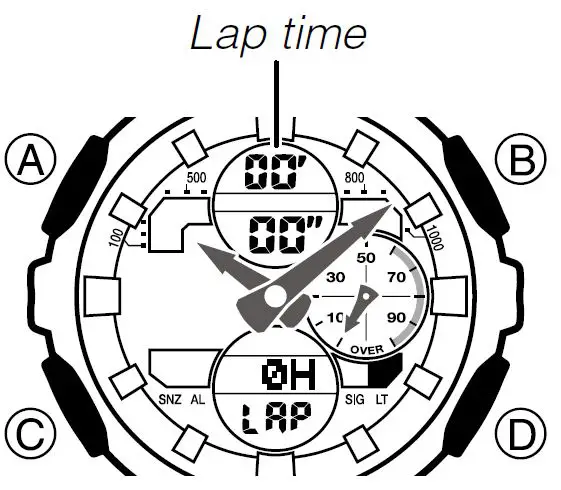
Split time readings appear in the upper digital display. They show the time elapsed since the beginning of the current time measurement.
- If you want the watch to calculate the speed of the race, specify the race distance for the distance setting (page E-15).
- For split time readings, you can specify the total race distance only. Though the watch will indicate a speed each time you take a split reading, they will be based on the total race distance, and so they will not indicate actual intermediate split speeds.
To set up the stopwatch to take split time readings
- In the Stopwatch Mode, make sure the stopwatch is stopped and reset to all zeros.
- If you need to reset the stopwatch to all zeros, press A.
- Make sure that SPL (split times) is shown in the lower digital display.
- If LAP (lap times) is displayed, press A to toggle it to SPL.
To perform a split time measurement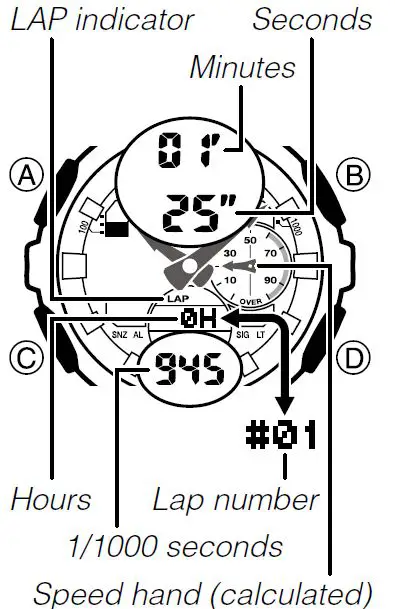
Select split time (SPL) measurement and then perform the following button operations. D Start ➝ A Split ➝ A Split Release* ➝ D Stop ➝ A Reset
* The split time is released automatically if you do not press A within about 12 seconds.
- You can press A to take split readings as many times as you like. The SPL indicator flashes while a split reading is displayed.
- The stopwatch continues elapsed time measurement internally while a split time reading is displayed.
- Pressing A while a split time is displayed will switch back to normal elapsed time measurement. The elapsed time will appear in the upper digital display.
- You also could press D to stop elapsed time measurement instead.
- Pressing D to stop elapsed time measurement displays the time (and speed if a distance is specified) of the final split (which is the overall elapsed time).
Countdown Timer
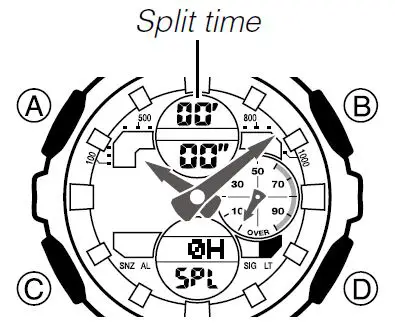
You can set the countdown start time within a range of one minute to 24 hours. An alarm sounds when the countdown reaches zero.
- You also can select auto-repeat, which automatically restarts the countdown from the original value you set whenever zero is reached.
- All of the operations in this section are performed in the Countdown Timer Mode, which you enter by pressing C (page E-7).
To use the countdown timer
Press D while in the Countdown Timer Mode to start the countdown in the upper digital display.
- When the end of the countdown is reached, the alarm will sound for 10 seconds or until you stop it by pressing any button.
- If auto-repeat is turned off, the countdown time is reset to its starting value automatically after the alarm stops.
- If auto-repeat is turned on, the countdown will restart automatically without pausing when it reaches zero.
- The countdown timer measurement operation continues even if you exit the Countdown Timer Mode.
- Press D while a countdown operation is in progress to pause it. Press D again to resume the countdown.
- To stop a countdown timer operation completely, first pause it (by pressing D), and then press A. This returns the countdown time to its starting value.
To configure countdown start time and auto-repeat settings
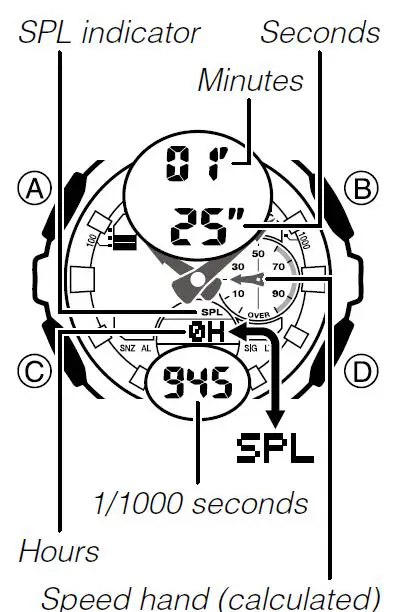
- While the countdown start time is in the Countdown Timer Mode, hold down A for at least three seconds until the hour setting of the countdown start time starts to flash. This is the setting mode.
- If the countdown start time is not displayed, use the procedure under “To use the countdown timer” (page E-27) to display it.
- Press C to move the flashing in the sequence shown below, and select the setting you want to change.
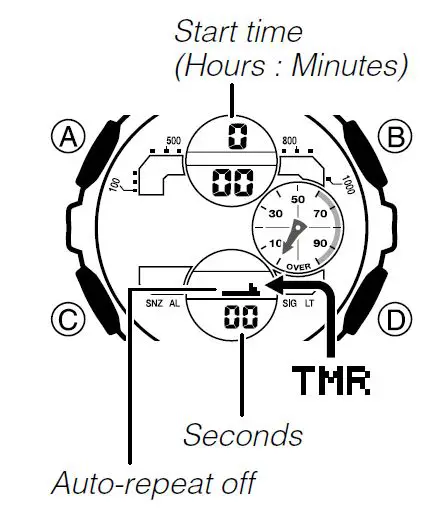
- Perform the following operations, depending on which setting currently is selected above.
- While the start time setting is flashing, use D (+) and B (–) to change it.
- To toggle auto repeat between on and off, press D while the on/off setting is flashing.
- Press A to exit the setting mode.
- The auto-repeat on ( ) indicator is displayed on the Countdown Timer Mode screen while this function is turned on.
World Time
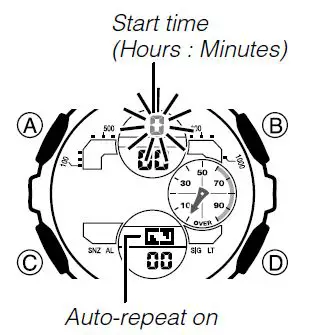
World Time digitally displays the current time in one of 48 cities (29 time zones) around the world. A simple operation swaps your Home City with the currently selected World Time City.
- The times kept in the World Time Mode are synchronized with the time being kept in the Timekeeping Mode. If you feel that there is an error in any World Time Mode time, check to make sure you have the correct city selected as your Home City. Also check to make sure that the current time as shown in the Timekeeping Mode is correct.
- Times in the World Time Mode are based on UTC offsets. See the “City Code Table” at the back of this manual for information about the UTC offsets that are supported.
- All of the operations in this section are performed in the World Time Mode, which you enter by pressing C (page E-7).
To view the current time in another time zone
In the World Time Mode, use D to scroll through available city codes (time zones).
- The upper digital display will show the time in the currently selected World Time City.
- A PM indicator will be displayed in the upper digital display between the hours of noon and midnight.
- When the city code (time zone) you want is selected, you can press A to display the date. After about one second, the watch will resume regular timekeeping for the currently selected city.

To toggle a city code time between Standard Time and Daylight Saving Time
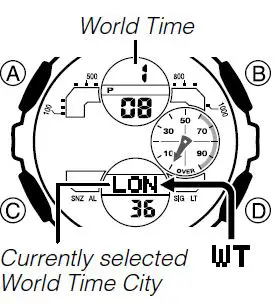
- In the World Time Mode, press D to display the city code (time zone) whose Standard Time/Daylight Saving Time setting you want to change.
- Hold down A for at least three seconds to toggle between Daylight Saving Time (DST indicator displayed) and Standard Time (DST indicator not displayed).
- A DST indicator will be displayed in the upper digital display if Daylight Saving Time is turned on.
- You can turn on DST individually for each city code, except UTC.
- Turning on DST for the city code that is currently selected as your Home City will turn on DST for normal timekeeping.
Swapping your Home City and World Time City
You can use the procedure below to swap your Home City and World Time City. This changes your Home City to your World Time City, and your World Time City to your Home City. This capability can come in handy when you frequently travel between two cities in different time zones.
To swap your Home City and World Time City
- In the World Time Mode, use D to select the World Time City you want.
- Hold down A and B until the watch beeps.
- This will make the World Time City you selected in step 1 your Home City, and cause the hour and minute hands to move to the current time in that city. At the same time, it will change the Home City you had selected prior to step 2 your World Time City, and cause the content of upper digital display to change accordingly.
- After swapping the Home City and World Time City, the watch stays in the World Time Mode with the city that was selected as the Home City prior to step 2 now displayed as the World Time City.
Alarms
When an alarm is turned on, the alarm tone will sound when its alarm time is reached. One of the alarms is a snooze alarm, while the other four are daily alarms. You also can turn on an Hourly Time Signal that causes the watch to beep twice every hour on the hour.
- There are five alarm screens numbered AL1, AL2, AL3 and AL4 for the daily alarm, and a snooze alarm screen indicated by SNZ. The Hourly Time Signal screen is indicated by SIG.
- All of the operations in this section are performed in the Alarm Mode, which you enter by pressing C (page E-7).
To set an alarm time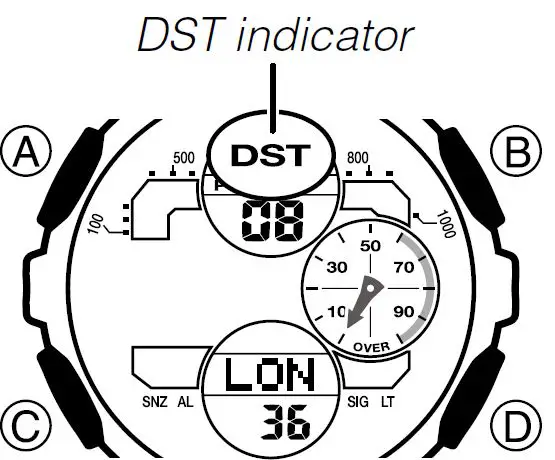
- In the Alarm Mode, use D to scroll through the alarm screens until the one whose time you want to set is displayed.
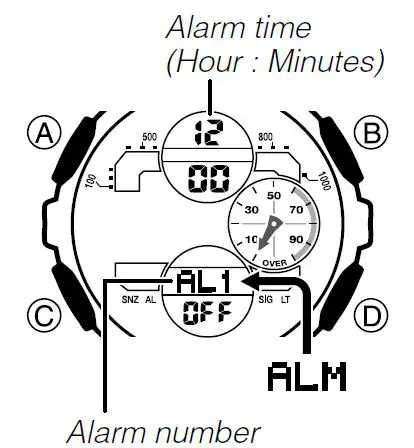
- To set a daily alarm, display alarm screen AL1, AL2, AL3 or AL4. To set the snooze alarm, display the SNZ screen.
- SIG is the Hourly Time Signal setting (page E-38).
- The snooze alarm repeats every five minutes.
- After you select an alarm, hold down A for at least three seconds until the hour setting of the alarm time starts to flash. This is the setting mode.
- This operation turns on the alarm automatically.
- Press C to move the flashing between the hour and minute settings.
- While a setting is flashing, use D (+) and B (–) to change it.
- Press A to exit the setting mode.
Alarm Operation
The alarm tone sounds at the preset time for 10 seconds, regardless of the mode the watch is in. In the case of the snooze alarm, the alarm operation is performed a total of seven times, every five minutes, or until you turn the alarm off (page E-37).
- Alarm and Hourly Time Signal operations are performed in accordance with the current time in your Home City, as kept in the Timekeeping Mode.
- To stop the alarm tone after it starts to sound, press any button.
- Performing any one of the following operations during a 5-minute interval between snooze alarms cancels the current snooze alarm operation. Displaying the Timekeeping Mode setting screen (page E-9) Displaying the SNZ setting screen (page E-35)
To turn an alarm on and off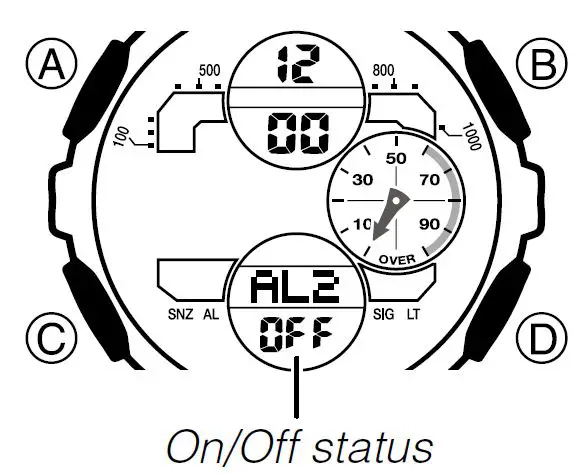
- In the Alarm Mode, use D to select an alarm.
- Press A to toggle it on (on) and off (OFF).
- Turning on a alarm (AL1, AL2, AL3, AL4 or SNZ) displays the alarm on indicator on its Alarm Mode screen.
- In all modes, the alarm on indicator is shown when any alarm is turned on.
- The alarm on indicator flashes while the alarm is sounding.
- The snooze alarm indicator flashes while the snooze alarm is sounding and during the 5-minute intervals between alarms.
To turn the Hourly Time Signal on and off
- In the Alarm Mode, use D to select the Hourly Time Signal (SIG) (page E-35).
- Press A to toggle it on (on) and off (OFF).
- The Hourly Time Signal on indicator is shown on the display in all modes while this function is turned on.
Illumination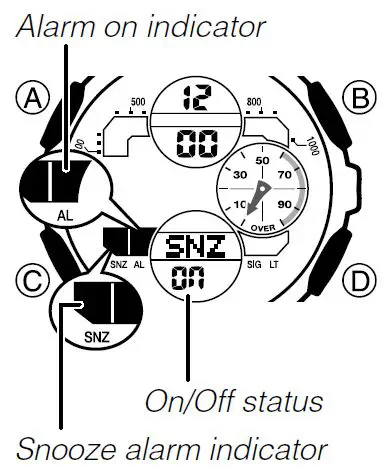
An LED (light-emitting diode) illuminates the face of the watch for easy reading in the dark. The watch’s auto light switch turns on illumination automatically when you angle the watch towards your face.
- The auto light switch must be turned on (indicated by the auto light switch on indicator) for it to operate.
- See “Illumination Precautions” (page E-48) for other important information about using illumination.
To illuminate the face manually
In any mode, press B to turn on illumination.
- The above operation turns on illumination regardless of the current auto light switch setting.
- You can use the procedure below to select either 1.5 seconds or 3 seconds as the illumination duration. When you press B, illumination will remain on for about 1.5 seconds or 3 seconds, depending on the current illumination duration setting.
To specify the illumination duration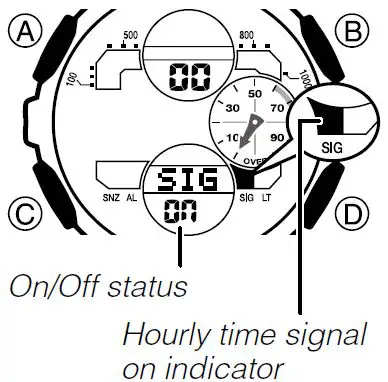
- In the Timekeeping Mode, hold down A until the display contents start to flash. This is the setting mode.
- Press C nine times to display the current illumination duration LT1 or LT3.
- Press D to toggle the setting between LT1 (1.5 seconds) and LT3 (three seconds).
- Press A to exit the setting mode.
About the Auto Light Switch
Turning on the auto light switch causes illumination to turn on, whenever you position your wrist as described below in any mode. Moving the watch to a position that is parallel to the ground and then tilting it towards you more than 40 degrees causes illumination to turn on.
- Wear the watch on the outside of your wrist.
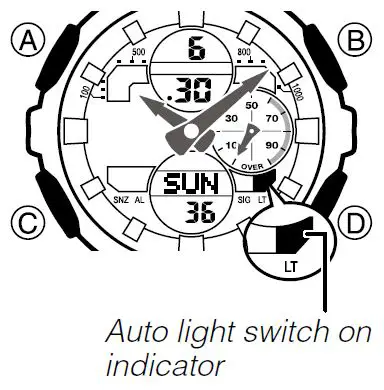
Warning!
- Always make sure you are in a safe place whenever you are reading the watch using the auto light switch. Be especially careful when running or engaged in any other activity that can result in accident or injury. Also take care that sudden illumination by the auto light switch does not startle or distract others around you.
- When you are wearing the watch, make sure that its auto light switch is turned off before riding a bicycle or operating a motorcycle or any other motor vehicle. Sudden and unintended operation of the auto light switch can create a distraction, which can result in a traffic accident and serious personal injury.
To turn the auto light switch on and off
In the Timekeeping Mode, hold down B for at least three seconds to toggle the auto light switch on (auto light switch on indicator displayed) and off (auto light switch on indicator not displayed).
- The auto light switch on indicator remains in all modes while the auto light switch is turned on.
- In order to protect against running down the battery, the auto light switch will turn off automatically approximately six hours after you turn it on. Repeat the above procedure to turn the auto light switch back on if you want.
Hand Home Position Correction
The speed, hour, and minute hands of the watch can be thrown off by exposure to strong magnetism or impact. The watch is designed to correct speed, hour and minute hand manually.
To adjust home positions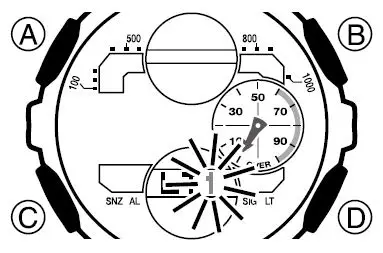
- In the Timekeeping Mode, hold down D for at least three seconds until Sub flashes in the upper digital display.
- This is the home position adjustment mode.
- Check the position of the speed hand.
- The speed hand is in the correct home position if it is pointed at 50 (12 o’clock). If it isn’t, use D to move the hand clockwise until it is.
- After confirming that the speed hand is in its correct home position, press C.

- Check the positions of the hour and minute hands.
- The hands are in the correct home positions if they are pointed at 12 o’clock. If they aren’t, use D (clockwise) and B (counterclockwise) to adjust their positions.
- When everything is the way you want, press A to return to regular timekeeping.
- This will cause the hour and minute hands to move to the current Timekeeping Mode time and the speed hand to move to the 0 position.
- Pressing C here will return to the setting at the beginning of step 2.
Reference
This section contains more detailed and technical information about watch operation. It also contains important precautions and notes about the various features and functions of this watch.
Auto Return Features
- If you leave the watch with a flashing setting on any digital display for two or three minutes without performing any operation, the watch will exit the setting mode automatically.
- The watch will return to the Timekeeping Mode automatically if you do not perform any operation for two or three minutes in the Alarm Mode.
High-Speed Movement
- The D and B buttons are used to change setting in various setting modes. In most cases, holding down these buttons will start high-speed movement.
Initial Screens
When you enter the Stopwatch Mode, World Time Mode or Alarm Mode, the data you were viewing when you last exited the mode will appear first.
Timekeeping
- Resetting the seconds to 00 while the current count is in the range of 30 to 59 causes the minutes to be increased by 1. In the range of 00 to 29, the seconds are reset to 00 without changing the minutes.
- The year can be set in the range of 2000 to 2099.
- The watch’s built-in full automatic calendar makes allowances for different month lengths and leap years. Once you set the date, there should be no reason to change it except when battery has replaced.
- The current time for all city codes in the Timekeeping Mode and World Time Mode is calculated in accordance with the Coordinated Universal Time (UTC) for each city, based on your Home City time setting.
Illumination Precautions
- Illumination may be difficult to see when viewed under direct sunlight.
- Illumination turns off automatically whenever an alarm sounds.
- Frequent use of illumination runs down the battery.
Auto light switch precautions
- Avoid wearing the watch on the inside of your wrist. Doing so causes the auto light switch to operate when it is not needed, which shortens battery life. If you want to wear the watch on the inside of your wrist, turn off the auto light switch feature.
- Illumination may not turn on if the face of the watch is more than 15 degrees above or below parallel. Make sure that the back of your hand is parallel to the ground.
- Illumination turns off in about 1.5 seconds or 3 seconds, even if you keep the watch pointed towards your face.
- Static electricity or magnetic force can interfere with proper operation of the auto light switch. If illumination does not turn on, try moving the watch back to the starting position (parallel with the ground) and then tilt it back toward you again. If this does not work, drop your arm all the way down so it hangs at your side, and then bring it back up again.
- Under certain conditions, illumination may not turn on until about one second after you turn the face of the watch towards you. This does not necessarily indicate malfunction of the auto light switch.
- You may notice a very faint clicking sound coming from the watch when it is shaken back and forth. This sound is caused by mechanical operation of the auto light switch, and does not indicate a problem with the watch.
Specifications
- Accuracy at normal temperature: ± 15 seconds a month
- Digital Timekeeping: Hour, minutes, seconds, p.m. (P), month, day, day of the week
- Time format: 12-hour and 24-hour
- Calendar system: Full Auto-calendar pre-programmed from the year 2000 to 2099
- Other: Home City code (can be assigned one of 48 city codes); Standard Time /
- Daylight Saving Time (summer time) Analog Timekeeping: Hour, minutes (hand moves every 20 seconds) Stopwatch:
- Measuring unit: 1/1000 seconds
- Measuring capacity: 99:59’59.999″
- Measuring accuracy: ±0.0006%
- Measuring modes: Elapsed time, Lap time, Split time
- Other: Speed
- Countdown Timer:
- Measuring unit: 1 second
- Input range: 1 minute to 24 hours (1-minute increments)
- Other: Auto-repeat timing
- World Time: 48 cities (29 time zones)
- Other: Daylight Saving Time/Standard Time; Home City/World Time City
Swapping - Alarms: 5 daily alarms (with one snooze alarm); Hourly Time Signal
- Illumination: LED (light-emitting diode); Auto Light Switch; Selectable illumination duration
- Battery: One lithium battery (Type: CR1220)
- Approximate Battery Life: 2 years on type CR1220 (10 seconds of alarm operation per day, one illumination operation (1.5 seconds) per day)
Specifications are subject to change without notice.
Countdown Timer:
- Measuring unit: 1 second
- Input range: 1 minute to 24 hours (1-minute increments)
- Other: Auto-repeat timing
- World Time: 48 cities (29 time zones)
- Other: Daylight Saving Time/Standard Time; Home City/World Time City
Swapping - Alarms: 5 daily alarms (with one snooze alarm); Hourly Time Signal
- Illumination: LED (light-emitting diode); Auto Light Switch; Selectable illumination duration
- Battery: One lithium battery (Type: CR1220)
- Approximate Battery Life: 2 years on type CR1220 (10 seconds of alarm operation per day, one illumination operation (1.5 seconds) per day)
Specifications are subject to change without notice.
Operating Precautions
Water Resistance
- The information below applies to watches with WATER RESIST or WATER RESISTANT marked on the back cover.
Water Resistance Under Daily Use Enhanced Water Resistance Under Daily Use 5 Atmospheres
10 Atmospheres
20 Atmospheres
Marking On watch front or on back cover No BAR mark 5BAR 10BAR 20BAR Example of Daily Use Hand washing, rain Yes Yes Yes Yes Water-related work, swimming No Yes Yes Yes Windsurfing No No Yes Yes Skin diving No No Yes Yes - Do not use your watch for scuba diving or other types of diving that requires air tanks.
- Watches that do not have WATER RESIST or WATER RESISTANT marked on the back cover are not protected against the effects of sweat. Avoid using such a watch under conditions where it will be exposed to large amounts of sweat or moisture, or to direct splashing with water.
- Even if a watch is water resistant, note the usage precautions described below. Such types of use reduce water resistance performance and can cause fogging of the glass.
- Do not operate the crown or buttons while your watch is submersed in water or wet.
- Avoid wearing your watch while in the bath.
- Do not wear your watch while in a heated swimming pool, sauna, or any other high temperature/high humidity environment.
- Do not wear your watch while washing your hands or face, while doing housework, or while performing any other task that involves soaps or detergents.
- After submersion in seawater, use plain water to rinse all salt and dirt from your watch.
- To maintain water resistance, have the gaskets of your watch replaced periodically (about once every two or three years).
- A trained technician will inspect your watch for proper water resistance whenever you have its battery replaced. Battery replacement requires the use of special tools. Always request battery replacement from your original retailer or from an authorized CASIO service center.
- Some water-resistant watches come with fashionable leather bands. Avoid swimming, washing, or any other activity that causes direct exposure of a leather band to water.
- The inside surface of the watch glass may fog when the watch is exposed to a sudden drop in temperature. No problem is indicated if the fogging clears up relatively quickly. Sudden and extreme temperature changes (such as coming into an air conditioned room in the summer and standing close to an air conditioner outlet, or leaving a heated room in the winter and allowing your watch to come into contact with snow) can cause it to take longer for glass fogging to clear up. If glass fogging does not clear up or if you notice moisture inside of the glass, immediately stop using your watch and take it to your original retailer or to an authorized CASIO service center.
- Your water-resistant watch has been tested in accordance with International Organization for Standardization regulations.
Band
- Tightening the band too tightly can cause you to sweat and make it difficult for air to pass under the band, which can lead to skin irritation. Do not fasten the band too tightly. There should be enough room between the band and your wrist so you can insert your finger.
- Deterioration, rust, and other conditions can cause the band to break or come off of your watch, which in turn can cause band pins to fly out of position or to fall out. This creates the risk of your watch falling from your wrist and becoming lost, and also creates the risk of personal injury. Always take good care of your band and keep it clean.
- Immediately stop using a band if you even notice any of the following: loss of band flexibility, band cracks, band discoloration, band looseness, band connecting pin flying or falling out, or any other abnormality. Take your watch to your original retailer or to a CASIO service center for inspection and repair (for which you will be charged) or to have the band replaced (for which you will be charged).
Temperature
- Never leave your watch on the dashboard of a car, near a heater, or in any other location that is subject to very high temperatures. Do not leave your watch where it will be exposed to very low temperatures. Temperature extremes can cause your watch to lose or gain time, to stop, or otherwise malfunction.
- Leaving your watch in an area hotter than +60°C (140°F) for long periods can lead to problems with its LCD. The LCD may become difficult to read at temperatures lower than 0°C (32°F) and greater than +40°C (104°F).
Impact - Your watch is designed to withstand impact incurred during normal daily use and during light activity such as playing catch, tennis, etc. Dropping your watch or otherwise subjecting it to strong impact, however, can lead to malfunction. Note that watches with shock-resistant designs (G-SHOCK, BABY-G, G-MS) can be worn while operating a chain saw or engaging in other activities that generate strong vibration, or while engaging in strenuous sports activities (motocross, etc.)
Magnetism
- Though this watch is designed to maintain normal performance in DC magnetic fields up to 4800 A/m, it should not be allowed to come into contact with or be located close to a source of strong magnetism (audio speakers, magnetic necklace, cell phone, etc.) Sources of strong magnetism can affect the motor that moves the hands of the watch, causing them to slow down, speed up, or stop, resulting in the incorrect time being displayed.
- Very strong magnetism (from medical equipment, etc.) should be avoided because it can cause malfunction of your watch and damage to electronic components. Electrostatic Charge
- Exposure to very strong electrostatic charge can cause your watch to display the wrong time. Very strong electrostatic charge even can damage electronic components.
- Electrostatic charge can cause the display to go blank momentarily or cause a rainbow effect on the display.
Chemicals
Do not allow your watch to come into contact with thinner, gasoline, solvents, oils, or fats, or with any cleaners, adhesives, paints, medicines, or cosmetics that contain such ingredients. Doing so can cause discoloration of or damage to the resin case, resin band, leather, and other parts.
Storage
If you do not plan to use your watch for a long time, thoroughly wipe it free of all dirt, sweat, and moisture, and store it in a cool, dry place.
Resin Components
- Allowing your watch to remain in contact with other items or storing it together with other items for long periods while it is wet can cause color on resin components to transfer to the other items, or the color of the other items to transfer to the resin components of your watch. Be sure to dry off your watch thoroughly before storing it and make sure it is not in contact with other items.
- Leaving your watch where it is exposed to direct sunlight (ultraviolet rays) for long periods or failure to clean dirt from your watch for long periods can cause it to become discolored.
- Friction caused by certain conditions (strong external force, sustained rubbing, impact, etc.) can cause discoloration of painted components.
- If there are printed figures on the band, strong rubbing of the printed area can cause discoloration.
- Leaving your watch wet for long periods can cause fluorescent color to fade. Wipe the watch dry as soon as possible after it becomes wet.
- Semi-transparent resin parts can become discolored due to sweat and dirt, and if exposed to high temperatures and humidity for long periods.
- Daily use and long-term storage of your watch can lead to deterioration, breaking, or bending of resin components. The extent of such damage depends on usage conditions and storage conditions.
Leather Band
- Allowing your watch to remain in contact with other items or storing it together with other items for long periods while it is wet can cause the color of the leather band to transfer to the other items or the color of the other items to transfer to the leather band. Be sure to dry off your watch thoroughly with a soft cloth before storing it and make sure it is not in contact with other items.
- Leaving a leather band where it is exposed to direct sunlight (ultraviolet rays) for long periods or failure to clean dirt from a leather band for long periods can cause it to become discolored.
CAUTION: Exposing a leather band to rubbing or dirt can cause color transfer and discoloration.
Metal Components
- Failure to clean dirt from metal components can lead to formation of rust, even if components are stainless steel or plated. If metal components exposed to sweat or water, wipe thoroughly with a soft, absorbent cloth and then place the watch in a well-ventilated location to dry.
- Use a soft toothbrush or similar tool to scrub the metal with a weak solution of water and a mild neutral detergent, or with soapy water. Next, rinse with water to remove all remaining detergent and then wipe dry with a soft absorbent cloth. When washing metal components, wrap the watch case with kitchen plastic wrap so it does not come into contact with the detergent or soap.
Bacteria and Odor Resistant Band
- The bacteria and odor resistant band protects against odor generated by the formation of bacteria from sweat, which ensures comfort and hygiene. In order to ensure maximum bacteria and odor resistance, keep the band clean. Use an absorbent soft cloth to thoroughly wipe the band clean of dirt, sweat, and moisture. A bacteria and odor resistant band suppresses the formation of organisms and bacteria. It does not protect against rash due to allergic reaction, etc.
Liquid Crystal Display
- Display figures may be difficult to read when viewed from an angle.
Note: that CASIO COMPUTER CO., LTD. assumes no responsibility for any damage or loss suffered by you or any third party arising through the use of your watch or its malfunction.
User Maintenance
Caring for Your Watch
Remember that you wear your watch next to your skin, just like a piece of clothing. To ensure your watch performs at the level for which it is designed, keep it clean by frequently wiping with a soft cloth to keep your watch and band free of dirt, sweat, water and other foreign matter.
- Whenever your watch is exposed to sea water or mud, rinse it off with clean fresh water.
- For a metal band or a resin band with metal parts, use a soft toothbrush or similar tool to scrub the band with a weak solution of water and a mild neutral detergent, or with soapy water. Next, rinse with water to remove all remaining detergent and then wipe dry with a soft absorbent cloth. When washing the band, wrap the watch case with kitchen plastic wrap so it does not come into contact with the detergent or soap.
- For a resin band, wash with water and then wipe dry with a soft cloth. Note that sometimes a smudge like pattern may appear on the surface of a resin band. This will not have any effect on your skin or clothing. Wipe with a cloth to remove the smudge pattern.
- Clean water and sweat from a leather band by wiping with a soft cloth.
- Not operating a watch crown, buttons, or rotary bezel could lead to later problems with their operation. Periodically rotate the crown and rotary bezel, and press buttons to maintain proper operation.
Dangers of Poor Watch Care
Rust
- Though the metal steel used for your watch is highly rust-resistant, rust can form if your watch is not cleaned after it becomes dirty.
- Dirt on your watch can make it impossible for oxygen to come into contact with the metal, which can lead to breakdown of the oxidization layer on the metal surface and the formation of rust.
- Rust can cause sharp areas on metal components and can cause band pins to fly out of position or to fall out. If you ever notice any abnormality immediately stop using your watch and take it to your original retailer or to an authorized CASIO service center.
- Even if the surface of the metal appears clean, sweat and rust in crevasses can soil the sleeves of clothing, cause skin irritation, and even interfere with watch performance.
Premature Wear - Leaving sweat or water on a resin band or bezel, or storing your watch an area subject to high moisture can lead to premature wear, cuts, and breaks.
Skin Irritation - Individuals with sensitive skin or in poor physical condition may experience skin irritation when wearing a watch. Such individuals should keep their leather band or resin band particularly clean. Should you ever experience a rash or other skin irritation, immediately remove your watch and contact a skin care professional.
Battery Replacement - Leave battery replacement up to your original retailer or authorized CASIO service center.
- Have the battery replaced only with the type specified in the User’s Guide. Use of a different battery type can cause malfunction.
- When replacing the battery, also request a check for proper water resistance.
- Ornamental resin components may become worn, cracked, or bent over time when subjected to normal daily use. Note that if cracking or any other abnormality indicating possible damage is noticed in a watch submitted for battery replacement, your watch will be returned with an explanation of the abnormality, without the requested servicing being performed.
Initial Battery
- The battery that comes loaded in your watch when you purchase it is used for function and performance testing at the factory.
- The test battery may go dead quicker than the normally rated battery life as noted in the User’s Guide. Note that you will be charged for replacement of this battery, even if replacement is required within your watch’s warranty period.
Low Battery Power
- Low battery power is indicated by large timekeeping error, by dim display contents, or by a blank display.
- Operation while battery power is low can result in malfunction. Replace the battery as soon as possible.
City Code Table
| City Code | City | UTC Offset/ GMT Differential |
| PPG | Pago Pago | –11 |
| HNL | Honolulu | –10 |
| ANC | Anchorage | –9 |
| YVR | Vancouver | –8 |
| LAX | Los Angeles | |
| YEA | Edmonton | –7 |
| DEN | Denver | |
| MEX | Mexico City | –6 |
| CHI | Chicago |
| City Code | City | UTC Offset/ GMT Differential |
| MIA | Miami |
–5 |
| YTO | Toronto | |
| NYC | New York | |
| SCL | Santiago | –4 |
| YHZ | Halifax | |
| YYT | St. Johns | –3.5 |
| RIO | Rio De Janeiro | –3 |
| RAI | Praia | –1 |
| City Code | City | UTC Offset/ GMT Differential |
| UTC |
0 |
|
| LIS | Lisbon | |
| LON | London | |
| MAD | Madrid |
+1 |
| PAR | Paris | |
| ROM | Rome | |
| BER | Berlin | |
| STO | Stockholm | |
| ATH | Athens |
+2 |
| CAI | Cairo | |
| JRS | Jerusalem |
| City Code | City | UTC Offset/ GMT Differential |
| MOW | Moscow | +3 |
| JED | Jeddah | |
| THR | Tehran | +3.5 |
| DXB | Dubai | +4 |
| KBL | Kabul | +4.5 |
| KHI | Karachi | +5 |
| DEL | Delhi | +5.5 |
| DAC | Dhaka | +6 |
| RGN | Yangon | +6.5 |
| BKK | Bangkok | +7 |
| City Code | City | UTC Offset/ GMT Differential |
| SIN | Singapore |
+8 |
| HKG | Hong Kong | |
| BJS | Beijing | |
| TPE | Taipei | |
| SEL | Seoul | +9 |
| TYO | Tokyo | |
| ADL | Adelaide | +9.5 |
| GUM | Guam | +10 |
| SYD | Sydney | |
| NOU | Noumea | +11 |
| WLG | Wellington | +12 |
- This table shows the city codes of this watch (As of July 2018).
- The rules governing global times (UTC offset and GMT differential) and summer time are determined by each individual country.
CASIO COMPUTER CO., LTD.
6-2, Hon-machi 1-chome
Shibuya-ku, Tokyo 151-8543, Japan

